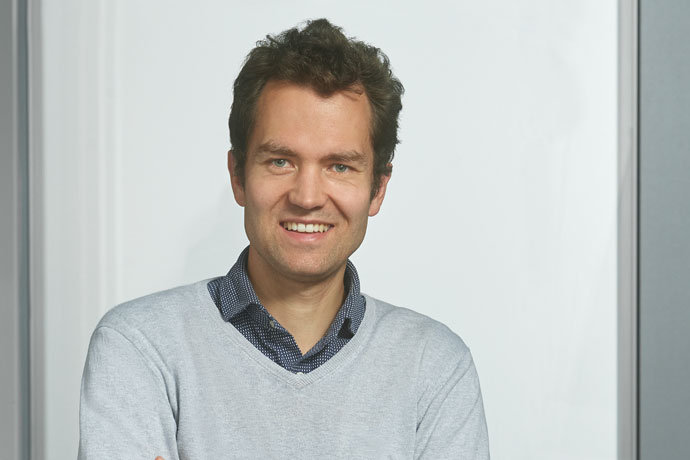
Head of the Research Department Data Science and its Applications
Prof. Dr. Sebastian Vollmer
Organizational unit
Data Science and its applications
Address
(Kaiserslautern)
Trippstadter Straße 12267663 Kaiserslautern

Publications
All publicationsProfile
Employment
- Since 2021
Professor for Application of Machine Learning at University Kaiserslautern-Landau (RPTU) - Since 2021
Senior Researcher DFKI – Research Department Leader from 1.11 - Since 2016
University of Warwick
Associate Professor at the Mathematics Institute and the Department of Statistics (tenured) setting research agendas, and delivering courses, staying across current academic research in data and statistics and supervising PhD and MSc students. - 2016-2021
Alan Turing Institute
1. Director for Data Study Groups since August 2017
2. Lead for the Data Science for Social Good initiative since September 2018
Co-Director for the Health & Medical Sciences Programme from August 2018 - 2017-2018
Public International Limited
Senior Consultant helping start-ups to transform the public sector
As part of this role, I advised the data strategy and technical questions for start-ups including Cera Care, Fly Notes and Rota Geek. Additionally, we delivered a training programme to CQC to upskill their staff on machine learning. - 2014-2016
University of Oxford
Departmental Lecturer at the Department of Statistics
Junior Research Fellow Somerville College - 2013-2014
University of Oxford
Postdoc with Professor Arnaud Doucet and Professor Yee Whye Teh on Bayesian Inference for Big Data with Stochastic Gradient Markov chain Monte Carlo
Education
- 2010-2013
PhD in mathematics, University of Warwick
ERC-studentship under the supervision of Professor Andrew Stuart and Professor Martin Hairer
Title of PhD-thesis: “Consistent and Efficient Inference for Complex Models” - 2009-2010
MSc in mathematics with distinction, University of Warwick
due to excellent performance at undergraduate level at Georg-August-Universität Göttingen, Germany - no BSc required
- 2014 Faculty prize of the University of Warwick for the best PhD thesis in mathematics
- 2009-13 Scholarship of the German Academy Foundation
- 2009 3rd prize at the International Mathematics Competition at university level in Bulgaria
Ai4Nof1
Entwicklung personalisierter, KI-gestützter Lebensstilinterventionen zur Verbesserung des Behandlungserfolgs und der Lebensqualität von Patienten mit chronischen Krankheiten, mit Erprobung des Konzepts für das Reizdarmsyndrom)In der evidenzbasierten Medizin gelten populationsbasierte randomisierte kontrollierte Studien als Goldstandard für die Abschätzung der Auswirkungen von Maßnahmen. Der durchschnittliche…
PIAD
Physics-informed Anomaly DetectionZiel dieses Projekts ist die Entwicklung einer neuen informierten Ki:
physik-informierte tiefe Anomalieerkennung.
Dabei wird auf modernste neuronale Anomalieerkennungsalgorithmen aufgebaut, die…
ML-Bau-Doc+
Maschinelles Lernen zur Informationsextraktion im Bereich GebäudedokumentationDie im Vorgängerprojekt „Maschinelles Lernen im Bereich Gebäudedokumentation (ML-BALI-DOK)"
(https://www.zukunftbau.de/projekte/forschungsfoerderung/1008187-2026) entwickelten Algorithmen ermöglichen…
TrustifAI
Mission Kl Innovation- and Quality Center (IQZ) Kaiserslautern (TrustifAI - Health and Wellbeing)Trustworthy AI applications for a secure future
Under the leadership of acatech – National Academy of Science and Engineering, MISSION KI aims to strengthen the trustworthiness and reliability of AI…

Eventful
timely models for individual & societal healthThis project focusses on the interconnected problems of measuring and predicting health and well-being. Health and well-being exist at two levels: within the individual, where we may observe or…